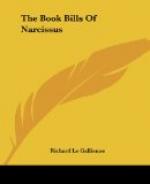I sometimes wonder as I come across the last frivolous gossip concerning that poet in the paragraphs of the new journalism, or meet his name in some distinguished bead-roll in The Morning Post, whether Narcissus was not, after all, mistaken about him, and whether he could still, season after season, go through the same stale round of reception, private view, first night, and all the various drill of fashion and folly, if that boy’s heart were alive still. One must believe it once throbbed in him: we have his poems for that, and a poem cannot lie; but it is hard to think that it could still keep on its young beating beneath such a choking pressure of convention, and in an air so ’sunken from the healthy breath of morn.’ But, on the other hand, I have almost a superstitious reliance on Narcissus’ intuition, a faculty in him which not I alone have marked, but which I know was the main secret of his appeal for women. They, as the natural possessors of the power, feel a singular kinship with a man who also possesses it, a gift as rarely found among his sex as that delicacy which largely depends on it, and which is the other sure clue to a woman’s love. She is so little used, poor flower, to be understood, and to meet with other regard than the gaze of satyrs.
However, be Narcissus’ intuition at fault or not in the main, still it was very sure that the boy’s heart in that man of the world did wake from its sleep for a while at the wandlike touch of his youth; and if, after all, as may be, Narcissus was but a new sensation in his jaded round, at least he was a healthy one. Nor did the callous ingratitude of forgetfulness which follows so swiftly upon mere sensation ever add another to the sorrows of my friend: for, during the last week before he left us, came a letter of love and cheer in that poet’s wonderful handwriting—handwriting delicious with honeyed lines, each word a flower, each letter rounded with the firm soft curves of hawthorn in bud, or the delicate knobs of palm against the sky.




